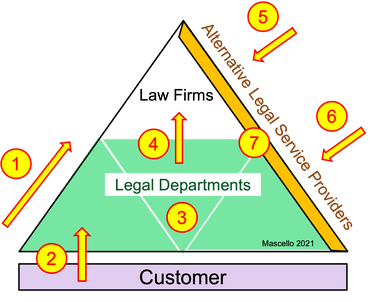As a first-year associate in a law firm, I was confronted by the question: must lawyers be able to dictate, or must they also be able to type? I recently showed here by means of a personal anecdote how at the time when desktop computers were introduced in all law firms, the issue of digitalisation already exposed a kind of generational conflict in the legal market. Almost thirty years on, all lawyers have a notebook and a smartphone, and now the new question is: must lawyers be able to program? My experience at the start of my career taught me that the development of digital competence must be understand as a journey with constant change; today, we would probably rather refer to terms such as agility and sprint. This is why I am relaxed when facing the gradual introduction of legal tech and AI in the legal market and excited when looking forward to the simplifications and the progress which this digitalisation step will entail.
The digital transformation in the legal market could proceed along the following seven steps.
Digital transformation in the legal market in seven steps (Mascello 2021)
Step 1: First the good news for lawyers: legal service providers (law firms, legal departments, New Law, etc.) will also exist in the future, possibly even more than ever. There will be an increase in laws that address the new digital challenges (such as data protection, ESG, ITC law). And customers will have to comply with them (e.g. compliance) and absorb the new risks (e.g. cyber risk).
Step 2: Companies will expect their legal departments to support them in the management of these new risks, too, rather than merely providing correct legal advice. Furthermore, they will demand their contribution towards the company’s financial health (i.e. increase in efficiency).
Step 3: Legal departments will manage their resources and know-how better. This also involves rethinking non-legal tasks (legal operations), conducting work with technical support and possibly not only employing an operations manager, but even a digital legal officer.
Step 4: Not surprisingly, legal departments will pass on their pressure to external suppliers. Law firms will not only be called upon to offer more favourably priced fee models (lower hourly rates, alternative fee arrangements), but also to reduce the hours required – through the use of technical solutions (e.g., electronic document review in data rooms).
Step 5: If law firms should not be able or not want to satisfy this customer requirement, customers will pass on this work directly to third parties (so-called ALSPs such as tech law companies), which will be prepared for this and position themselves on the market with increasing success.
Step 6: The same will happen on the part of legal departments. They will need to consider having certain work that they previously did themselves outsourced to third parties which can do the tasks faster, cheaper or better.
Step 7: For customers, it would be most convenient if there were someone who would combine the advantages of all three providers (law firms, legal departments and ALSPs) and offer them under one single umbrella. This will take some time to happen, however, because ALSPs will first have to consolidate and organise themselves better in order to position themselves as powerful providers with an even more convincing USP.
Of course, we can gab about magnificent apps and regularly bandy about the buzzword of artificial intelligence (AI). But as long as we are not ready to take digital changes in the market into appropriate consideration in our own strategies and in our (still reliable and working) business models, as long as value creation chains are not divided up in order to outsource certain tasks or have them done by “digital helpers”, as long as processes and organisations are not adapted to digital components, and as long as technology is called Legal Tech only because lawyers use it instead of often rather speaking about simple office tech only (such as means of communication, file storage), until then, the digital transformation process in the legal market is likely to take some more time and produce further generational conflicts. After all, innovation and new technical developments will not ask for advance approval, i.e. neither law firms nor legal departments have a right of first refusal. The changes will take place anyway. Therefore, the question for each individual legal service provider is merely whether, from when on and to what extent they will be part of it all themselves.
AI? That will come early enough. Until then, there is still plenty of preparation work to be done.
About the author(s)

Prof. Dr. Bruno Mascello Director, Academic Director Law & Management
Newsletter
Get the latest articles directly to your inbox.
Share article
More articles
The Future of Work and the Central Role of Diversity & Inclusion
Leadership in Transition: Five Trends of Modern Leadership
The future of work – also relevant for the legal market?
Why inclusive leadership matters for every generation
Do young lawyers need leadership, too? Classification according to generations – slightly arbitrary, but useful


